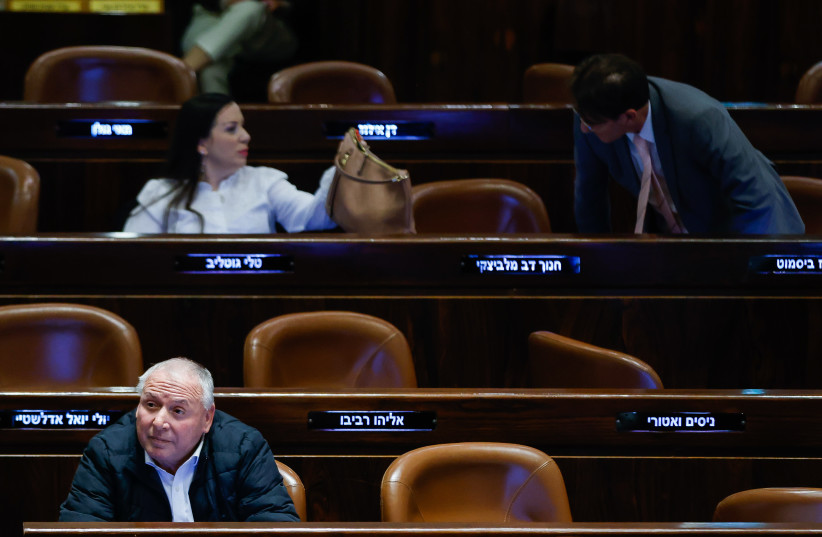The battle over the government's proposed judicial overhaul seems to have reached a tipping point this week, with reports emerging of at least two possible compromises that were formulated and proposed behind the scenes, and President Isaac Herzog's announcement that he would be putting forward a detailed proposal of his own in the near future.
At the same time, however, Knesset Constitution, Law, and Justice Committee chairman MK Simcha Rothman announced on Tuesday that the committee on Sunday would begin preparing the first leg of the reform for its second and third readings. This leg, which passed its first reading on the Knesset floor on February 21, gives the coalition the power to appoint judges at all levels of Israel's court system and also blocks the High Court of Justice's ability to rule on appeals against Basic Laws.
Rothman and Justice Minister Yariv Levin have shown no intention of pausing the legislative process, and this first leg could thus be put to a final vote within approximately two weeks.
If no compromise is reached until then, how certain is it that it will pass?
This first part of the reform is an amendment to the Basic Law: The Judiciary, and as such requires the support of at least 61 Knesset members.

The coalition currently numbers 64 MKs, but the number of senior Likud MKs who have expressed reservations about the pace of legislation grew in the past week.
MKs Danny Danon and Yuli Edelstein have long been considered as leading candidates to break from the official party line, as both are frustrated that they did not become ministers, and have served in senior government roles in the past, and are not as weary to voice differing opinions as some of the younger and newer Likud MKs.
Letter penned to recommend negotiations
The two published a letter on March 1 along with National Unity MKs Gadi Eisenkot and Chili Tropper calling on the sides to enter negotiations, and, implicitly – for the coalition to pause the legislative process. Neither said that they would oppose the legislation as it currently stands, but neither said that they would support it either. Even the option that they may abstain served as a deterrent to bringing the legislation as it is to a final vote.
Another Likud member to voice his opinion that a compromise needed to be reached was MK David Bitan. Unlike Danon and Edelstein, however, Bitan said that he would support the bill as it currently stands if no compromise is reached.
Two other senior Likud members have largely remained mum until now, but are facing significant pressure not to support the legislation as it stands – Defense Minister Yoav Gallant and Agriculture Minister and former Shin Bet head, Avi Dichter.
Gallant is facing a growing wave of reservists, including in key positions in the Israeli Air Force and in the Intelligence Directorate, who announced that they would cease to serve if the laws pass. If this wave continues to grow it potentially could damage the IDF's operative capabilities. Gallant said this week that he would not allow this to happen on his watch. He held discussions with senior IDF officers on the issue and said that he would guarantee that their voice would be heard "wherever is needed," indicating that he, too, may not support a final vote if he believes it could harm the IDF.
Dichter has largely remained silent, but a large number of fellow former Sayeret Matkal commandos and Shin Bet colleagues have been repeatedly demonstrating outside of his house and calling on him to speak up. During the Lapid-Bennett government, repeated demonstrations outside coalition members' houses proved an effective method and contributed to the government's fall.
It is enough for four out of Danon, Edelstein, Bitan, Gallant, and Dichter to abstain from the final vote for the legislation to fall. Perhaps more importantly, it is enough for four of them to pose a credible threat to abstain, for Prime Minister Benjamin Netanyahu, Levin, and Rothman to decide to delay the final vote so as not to risk humiliation.
But the four could face serious political consequences if they go down this path. Gallant, who missed out on the position of IDF chief of staff, is now in the role of his life as defense minister, and may not be willing to risk this. Both Danon and Edelstein aspire to lead the Likud in the post-Netanyahu era and may risk this if they torpedo the legislation.
The group of potential dissidents therefore will likely continue sitting on the fence for as long as possible and continue to push for compromise in order to avoid the bill reaching a final vote as it currently stands.

Netanyahu, at least outwardly, seems to be in the Levin-Rothman camp and supports pushing forward the legislation. In any case, he is legally barred from intervening in the legislative process due to his conflict-of-interest agreement. Levin thus has an important influence over the pace of legislation, and a final vote could still be held in the next two to three weeks.
In this scenario, the bill will likely still receive the necessary votes and pass into law. But the fact that this is not 100% guaranteed alters the dynamic of the process and increases the chance that some form of compromise will be reached, perhaps even at the last minute, before the bill as it currently stands becomes law.
